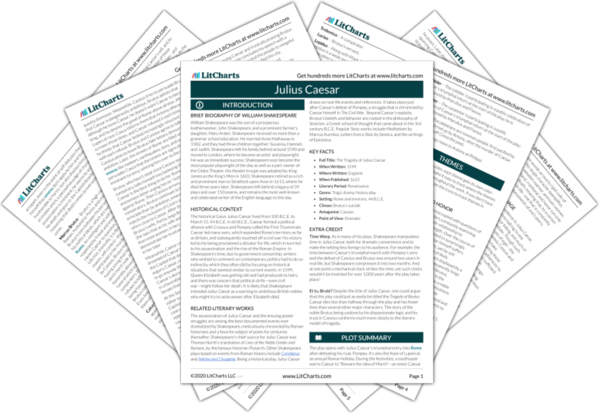Manhood and Honor
Julius Caesar is a play preoccupied with questions of masculinity, with characters constantly examining their actions in light of their relationship to accepted ideas of manly virtue and strength. Over the course of the play, those accepted ideas are presented in surprisingly ambiguous ways. For example, Julius Caesar himself suffers from weaknesses that earn onlookers’ scorn, yet he still inspires fear, and he doesn’t falter in the face of likely assassination. Some of the “manliest”…
read analysis of Manhood and HonorLogic and Language
Though there is certainly violence in Julius Caesar, characters spend far more time talking to one another than they do fighting or killing, and much of that talk takes the form of argument and debate. Though such argument and debate certainly involves the use of logic—the approach Brutus favors—other characters, namely Cassius and Antony, are skilled at manipulating language to make something seem logical when it is not. By contrasting these approaches and…
read analysis of Logic and LanguagePublic vs. Private
Julius Caesar isn’t only a play about political intrigue, but about the internal and domestic struggles that sometimes churn underneath such intrigue. Shakespeare takes care to portray the private struggles of major characters as they agonize over their future actions and are even advised by their wives. In particular, both Caesar and Brutus wrestle in different ways with the interplay between public and private. In both cases, private concerns must ultimately yield to what each…
read analysis of Public vs. Private
Politics and Morality
Since the Rome of Julius Caesar is portrayed as the pinnacle of civilization, arguments about Rome’s governance are also arguments about what constitutes an ideal government. The entire play centers around Brutus upholding the truth of two moral statements: First, that monarchy is intrinsically tyrannical; and secondly, that killing Caesar, an as-yet-innocent man, is morally acceptable if it prevents Rome from becoming a monarchy. Brutus's strict moral code makes no allowance for self-preservation, however…
read analysis of Politics and MoralityFate
During Caesar’s triumphal march into Rome, a soothsayer cries out from the crowd, “Beware the ides of March!” Later, on the day of the assassination, the soothsayer positions himself among the crowd once again. Caesar, who’d curtly dismissed him the first time, sees the soothsayer and says rather challengingly, “The ideas of March are come.” The soothsayer replies, “Aye, Caesar, but not gone.” This ambiguous scene sets the tone for the role of…
read analysis of Fate






